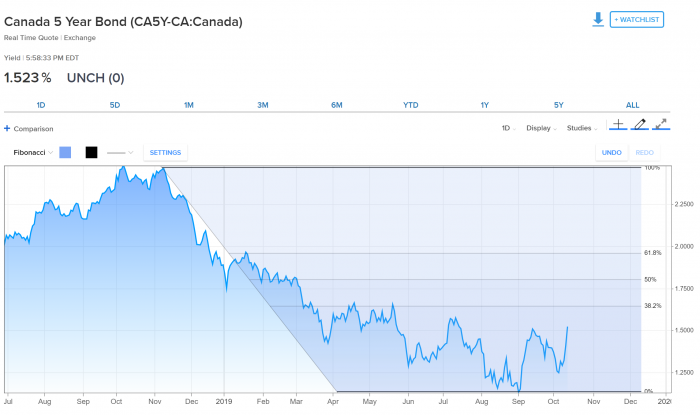 Bond yields erupted Friday for the biggest two-day gain since 2011. Canada’s 5-year yield—which is closely watched for its influence on fixed mortgage rates—closed at its highest point since July.
Bond yields erupted Friday for the biggest two-day gain since 2011. Canada’s 5-year yield—which is closely watched for its influence on fixed mortgage rates—closed at its highest point since July.
This comes after the Trumpinator heralded a potential U.S./China trade truce. The trade war, now a year and a half old, has pounded mortgage rates on the assumption that weaker trade would subdue inflation and require rate cuts.
But now, the Agitator-in-Chief has to get a deal done. His re-election depends on it. Optimism about a trade treaty could ultimately re-invigorate corporate spending, boost market sentiment and push up interest rates.
What Happens Next?
Trump struck a bargain on Chinese agricultural purchases, intellectual property protections and more, but the pact is far from sealed. China hasn’t confirmed some of the concessions Trump boasted of on Friday. It wants more talks this month to cement “phase one” of a deal.
As Capital Economics points out, “…So far, the official line from Beijing has been couched in terms of “progress” rather than an actual “deal.” Hence, bank on more drama to come.
Either way, the probability of resolution has risen and the probability of recession has fallen. That’s why rates catapulted 20+ basis points in the last two trading days.
From a technical standpoint, Canada’s benchmark 5-year yield could retrace as much as 25-30 basis points—i.e., climb as high as 1.75% to 1.80%+.
That kind of move (if it happens) would take average 5-year fixed rates up from 2.74% today back near 3.00%, someplace they haven’t been since May.
What happens after that is anyone’s guess.
As much as timing the rate market is ill-advised, some will see this as a cue to lock in. An AmeriChina trade pact would potentially take Bank of Canada rate cuts off the table through 2020, especially given our run of strong employment lately. Already, probabilities of a rate cut in 2020 have dived, as implied by derivatives prices.
Combine:
- decreasing chances of a BoC cut, with
- resilient Canadian economic data (particularly a hot jobs market), and
- variable mortgage rates that are above the best fixed rates, and
- 5-year fixed rates as low as 2.25% (insured) and 2.49% (uninsured)…
…and the result should be people continuing to lock-in, in droves.
Mind you, betting on rates to break their 2018 highs may be a stretch given:
- a Canadian bond market that’s still inverted (our 10-year yield is still 1/4-point below the overnight rate)
- tepid U.S. growth, and
- market worry over a potential Democratic win in 2020 (the U.S. election will sway Canadian rates).
The takeaway: If you’re mortgage shopping, well-qualified and can find a steal on a 2- or 3-year fixed term, that may be the best of all worlds. The near-term rate protection of a short-term fixed rate, combined with its refinance flexibility and discount versus a variable rate, should keep such terms appealing.

 log in
log in

3 Comments
Looks like a reverse head and shoulder bottom too.
We might get to 1.75% this week!
The upbeat mood marks a pivot from the summer, when worries about trade, Britain s potentially messy exit from the European Union and the slowing global economy loomed over the market.